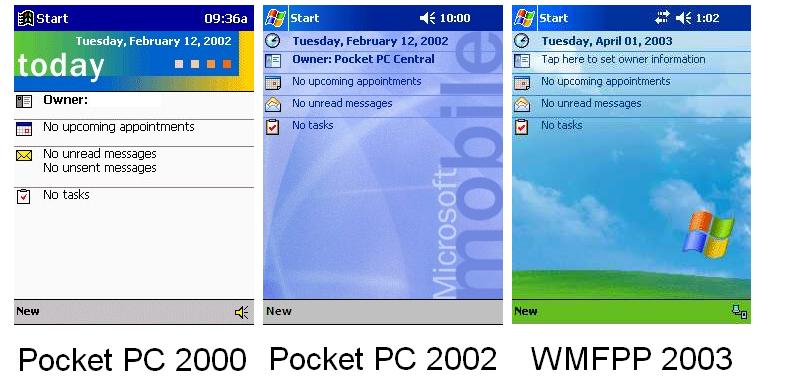Pocket PC
|
|
Pocket_PC.jpg
A Pocket PC is a computer in a handheld size that runs a variation of the operating system Windows CE. It has many capabilities of modern desktop PCs. Currently there are thousands of applications for Pocket PC, many free. Some of these devices, running Microsoft Windows Mobile 2003 Phone Edition, also include mobile phone features. Pocket PCs can also be used with many other add-ons like GPS receivers or barcode readers.
According to Microsoft, the Pocket PC is "a handheld device that enables users to store and retrieve e-mail, contacts, appointments, play multimedia files, games, exchange text messages with MSN Messenger, browse the Web, and more." [1] (http://www.microsoft.com/mobile/buyersguide/educateme/default.asp)
Pocket PC is commonly abbreviated to "PPC".
From a technical standpoint, "Pocket PC" is a standard from Microsoft that sets various hardware and software requirements for mobile devices bearing the "Pocket PC" label.
For instance, any device which is to be classified as a Pocket PC must:
- Run Microsoft's Windows CE (PocketPC version) operating system
- Come bundled with a specific suite of applications in ROM
- Include a touchscreen
- Include a directional pad or touchpad (case of HP iPAQ hx4700)
- Include a set of hardware application buttons
- Be based on a ARM version 4 compatible CPU, Intel XScale CPU, MIPS CPU or SH3 CPU.
- Pocket PC 2002 ( codename Merlin ) works only with ARM-based CPUs.
Microsoft's current release is Windows Mobile 2003 Second Edition, which adds native landscape support as well as other fixes and changes to those features already present in the original release of WM2003. The first device to come with 2003SE was the Dell Axim x30.
The previous operating system, Microsoft Windows Mobile 2003 for Pocket PC, consists of the Windows CE.NET 4.2 operating system bundled with scaled-down versions of many popular desktop applications, including Microsoft Outlook, Internet Explorer, Word, Excel, Windows Media Player, and others. Past Pocket PC operating systems include Pocket PC 2002 (launched October 2001) and Pocket PC 2000 (launched April 2000), both running Windows CE 3.0 underneath.
Windows Mobile 5 (http://www.microsoft.com/windowsmobile/5/), internally code-named Magneto, was officially released by Microsoft on May 10, 2005. Based on Windows CE 5.1, Windows Mobile 5 incorporates features such as Direct3D Mobile, integrated Bluetooth and WiFi stacks, and the ability to be mounted as a USB Mass Storage device, bypassing ActiveSync. Pocket Word and Pocket Excel have been renamed Word Mobile and Excel Mobile, respectively, and both applications have gained more complete feature sets, including support for tables, ordered lists, and embedded graphics in Word Mobile, and support for charts in Excel Mobile. PowerPoint Mobile, a new addition to the Office Mobile suite, supports the ability to display and edit PowerPoint presentations on a Pocket PC. Windows Mobile 5 also improves support for one-handed usage by inserting two, context-sensitive "soft" buttons at the bottom of the screen which can be mapped to hardware buttons on any specific device.
Windows Mobile 5 marks the convergence of the Phone Edition and Professional Edition operating systems into one system that contains both phone and PDA capabilities. A 'Phone' application is now included in the OS, and all PIM applications have been updated to interface with it. Windows Mobile 2005 is compatible with Microsoft's Smartphone operating system and is capable of running Smartphone applications.
Pocket PCs have generally stored user-installed applications and data in RAM, which meant that if the battery was depleted the device would lose all of its data. Windows Mobile 5 solves this problem by storing all user data in the ROM, leaving the RAM to be used only for running applications, as it would be on a desktop computer. As a result, Windows Mobile 5 Pocket PCs generally have a greater amount of flash ROM, and a smaller amount of RAM, compared to earlier devices.
Currently, no Pocket PCs ship with the new operating system, but vendors such as HTC have announced upcoming Windows Mobile 5 devices, and other vendors including Dell and HP have announced upgrades for some of their Windows Mobile 2003 SE devices. See press release for more information (http://www.microsoft.com/presspass/press/2005/may05/05-10WindowsMobile5PR.asp).
Pocket PCs are manufactured and sold by several different companies; the major manufacturers include HP (under the iPAQ and now defunct Jornada brands), Toshiba, ViewSonic, Dell, and Fujitsu Siemens. In Mid-2003, Gateway Computers and JVC announced that they too are releasing Pocket PCs. Prices in 2003 ranged from around $800 USD for the high-end models, some of which are combined with cell phones, to $200 for low-end models. A $100–$200 model is rumored to be released within 2004 or early 2005.
Before Pocket PCs were released, there were other Windows-based machines of the same form factor made by HP, Philips, and others called Palm-size PCs. These devices ran Windows CE 2.0–2.11 and had an interface that was nearly identical to the then-current desktop version of Windows, Windows 98.
| Contents |
See also
- Microsoft
- Windows Mobile
- Personal digital assistant
- Windows CE
- Windows CE 3.0
- Information appliance
- Wikipedia on your Pocket PC
External links
Official Links
- Official Site (http://www.microsoft.com/windowsmobile/) at Microsoft.com
History
- History of Windows CE (http://www.hpcfactor.com/support/windowsce/) at HPCFactor
Discussion
- PocketGamer (http://www.pocketgamer.org) — PPC Gaming news site
- PocketPC Thoughts (http://www.pocketpcthoughts.com) — General PPC news/discussion
Miscellaneous
- PDA Hotspots (http://www.wacklepedia.com/pdahotspots/pda_hotspots.htm) — PDA-friendly webportal
- Handhelds.org (http://www.handhelds.org) — Linux and Open Source Software for PPC
References
- Mobile-review.com (http://www.mobile-review.com/pda/articles/wm2005-magneto-en.shtml) — Preview of the operating system Windows Mobile 5.0 (Magneto)de:Microsoft Pocket PC
es:PocketPC fr:Microsoft Pocket PC nl:Pocket PC pl:Pocket PC zh:Pocket PC

